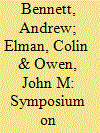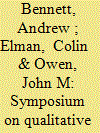|
|
|
Sort Order |
|
|
|
Items / Page
|
|
|
|
|
|
|
| Srl | Item |
| 1 |
ID:
068937


|
|
|
| 2 |
ID:
160063


|
|
|
|
|
| Summary/Abstract |
What is the global future of liberal internationalism (LI)? LI is an interlocking set of national and international institutions designed to maximize individual autonomy through peaceful commerce and self-government. Its future depends on the presence of a liberal hegemon, not only to provide global public goods but to promote liberal democracy by action and example. Hegemons are important to the international spread and contraction of a given regime type. They actively promote their institutions and weaken alternatives, and their successes (failures) inspire imitation (avoidance) in other countries. The future of liberalism was in doubt in the 1930s, but liberal states ended up defeating fascist and later communist ones, and the United States established the current LI system that went global after 1989. Today liberalism's superiority again is in doubt: The continuing rise of market-Leninist China interacts with a new diffidence in the United States to challenge the appeal of liberal democracy and hence LI. China appears to seek an internationalism that is less liberal. The future of LI will turn on how well the United States and other democracies, on the one hand, and China, on the other, respond to the relentless drives toward open economies and automation.
|
|
|
|
|
|
|
|
|
|
|
|
|
|
|
|
| 3 |
ID:
145678


|
|
|
|
|
| Summary/Abstract |
A political spring is an abrupt, broad, sustained increase in public dissent in a state that has prohibited it, as in Czechoslovakia in 1968 or Tunisia in early 2011. Some springs produce offspring – clusters of events within neighbouring states (civic unrest, increased state repression, co-option of dissent, revolution) and among those states (intensification of international rivalries, foreign interventions). An English Spring in 1558–9 produced such a cluster in Northwestern Europe. This article addresses the underlying causal mechanism connecting springs and their offspring, rather than the related correlational question (viz. under what conditions a spring is followed by offspring). That mechanism is transnational group polarisation, or the progressive separation of preferences across a population into pro- and anti-government groups. Transnational polarisation along a pro-versus-anti-government axis is an endogenous process triggered by exogenous events, such as violence or public demonstrations that raise the status of, or threat to, one of the groups. It presents powerful actors across states with new threats and opportunities and can help explain how the Tunisian Spring of early 2011 produced throughout the Arab Middle East infectious unrest, serial repressions and reforms, heightened international tensions, and foreign interventions.
|
|
|
|
|
|
|
|
|
|
|
|
|
|
|
|
| 4 |
ID:
141966


|
|
|
|
|
| Summary/Abstract |
The articles in this collection constitute the third of four symposia on qualitative and multi-method research in the study of national and international security. The symposia are the product of two workshops held in the fall of 2013, the first at the American Political Science Association annual meeting in Chicago and the second at the University of Virginia's Miller Center of Public Affairs. The conveners and participants are convinced that it would benefit scholars of security studies to be aware of some of the recent developments and debates among methodologists concerning qualitative and multi-method research. Each symposium comprises a longer essay with the author's view of the state-of-the-art on the topic at hand, and three shorter essays—typically one on specific applications to security studies, another on relevance to foreign policy making, and a final one featuring critical reflections.
|
|
|
|
|
|
|
|
|
|
|
|
|
|
|
|
| 5 |
ID:
147898


|
|
|
|
|
| Summary/Abstract |
The articles in this collection constitute Security Studies's fourth and final symposium on qualitative and multimethod research in the study of national and international security. The symposia are the product of two workshops held in the fall of 2013, the first at the American Political Science Association annual meeting in Chicago and the second at the University of Virginia's Miller Center of Public Affairs. The conveners and participants are convinced that it would benefit scholars of security studies to be aware of some of the recent developments and debates among methodologists concerning qualitative and multimethod research. Each symposium comprises a longer essay with the author's view of the state-of-the-art on the topic at hand and three shorter essays—typically one on specific applications to security studies, another on relevance to foreign policy making, and a final one featuring critical reflections.
|
|
|
|
|
|
|
|
|
|
|
|
|
|
|
|
| 6 |
ID:
180369


|
|
|
|
|
| Summary/Abstract |
If it continues, deglobalization may lead not to atomization but two overlapping international orders: a liberal one (LIO) led by the United States, and an authoritarian–capitalist one (ACIO) led by China. This equilibrium could emerge because a central purpose of international orders is to preserve the domestic regimes of their Great Power sponsors. The United States and China have markedly different domestic regimes, and so as China continues to grow in power and influence, tension over the content of international order should continue to grow. I borrow from Darwinian evolution the notion of ‘niche construction’: just as organisms alter phenotype selection by manipulating their natural environments, states can alter the ‘selection’ of domestic regimes by shaping their international environments. Modes of international niche construction include foreign regime promotion, interdependence, transnational interaction and multilateral institutions. The liberal democratic niche constructed by the United States and its allies after the Second World War preserved democracy for many decades. Today, China is attempting through various means to build a niche that will eliminate the liberal bias in international institutions and safeguard its own Market-Leninist regime. The resulting ACIO would select for autocracy and hence be partially separate from the LIO, which selects for liberal democracy.
|
|
|
|
|
|
|
|
|
|
|
|
|
|
|
|
|
|
|
|
|